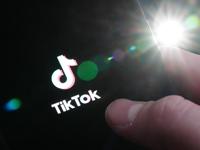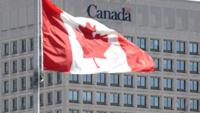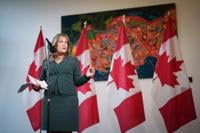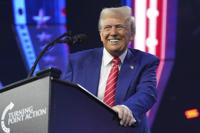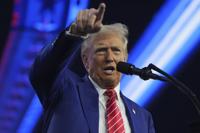OTTAWA - Canadian politicians have started deactivating their TikTok accounts after the federal government and House of Commons both decided to ban the app from their devices.
The video-focused social media platform has come under increased scrutiny in Canada and elsewhere because the Chinese government has a stake in its owner, ByteDance, and Chinese laws allow the country to demand access to user data.
Conservative Leader Pierre Poilievre has already suspended his use of the TikTok video app and a spokesman says all members of caucus will do the same.
"We will fully comply with the directive to remove TikTok from government devices and will work to see that this ban is extended to include parliamentary devices," spokesman Sebastian Skamski said in a written statement.
Treasury Board President Mona Fortier's office says all Liberal MPs have been asked to suspend their TikTok accounts and remove the app from both their work and personal devices.
New Democratic Leader Jagmeet Singh says he plans to suspend his account by the end of Tuesday, but did not say whether all of his MPs would follow suit.
"As (for) the rest of caucus, we'll be complying with the House of Commons rules and that's something that all New Democrats will be doing," Singh told reporters at a press conference on Tuesday.
The Bloc Québécois also announced that its MPs and staff will delete the app from their work devices. The Bloc also said it has deleted the party's TikTok account.
The House of Commons rules mean the app must be removed from House-provided devices by Friday, but they do not extend to banning the use of the app on personal devices.
Singh is one of the most-followed Canadian politicians with nearly 880,000 followers and 9.5 million likes on his videos. His use of TikTok grabbed attention and headlines during the 2021 federal election.
While a postelection debrief report said social media helped the NDP build support, especially with younger voters, it also pointed out there was a suggestion that Singh's popularity on TikTok "makes him appear 'less serious.'"
Singh told reporters on Tuesday he is not worried about losing a tool that can help connect with a younger audience.
"I have no concern at all about taking a step back from a social media platform when there are serious concerns around security, data and privacy, particularly not just for myself but the people that interact with me," said Singh.
Fortier announced Monday that Canada would ban TikTok from all government-issued devices, after similar moves in the United States and European Union.
The decision followed a review by the chief information officer of Canada, who determined that TikTok posed an "unacceptable" level of risk to privacy and security.
Sara Grimes, director of the Knowledge Media Design Institute at the University of Toronto, said the move suggests the federal government has received new information about the platform's data collection that drove them to take immediate action.
"When the story first broke, it (seemed) like more of a precautionary move," said Grimes.
"But the language in the statement released by the Treasury Board yesterday and comments coming from government officials, including from the prime minister himself, strongly suggest there's more to it than that."
The United States has given government officials 30 days to delete TikTok from all federal devices. Officials said the decision was due to security concerns amid tension with China.
At a press conference in Beijing on Tuesday, Mao Ning, a spokeswoman for the Chinese foreign minister, questioned how "unsure" the United States was to create fear around what she called "young people's favourite app."
"The U.S. has been overstretching the concept of national security and abusing state power to suppress foreign companies," said Ning in an official English translation of her remarks.
"The U.S. government should respect the principles of market economy and fair competition, stop suppressing the companies and provide an open, fair and non-discriminatory environment for foreign companies in the U.S."
Fortier said in a statement on Monday that there has been no evidence to date that government information has been compromised.
Provinces including Quebec are following the federal government's lead, banning the installation and use of the social media platform on government cellphones as of Tuesday.
Last week, provincial and federal privacy watchdogs announced an investigation to delve into whether TikTok complies with Canadian privacy legislation.
This report by Ďă¸ŰÁůşĎ˛ĘąŇĹĆ×ĘÁĎ was first published Feb. 28, 2023.
—â¶Ä”â¶Ä”
This story was produced with the financial assistance of the Meta and Canadian Press News Fellowship.


